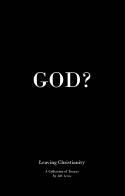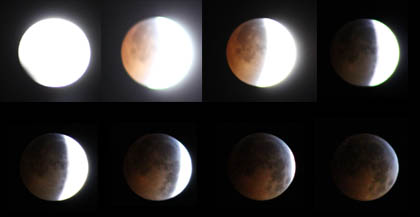 Christmas isn't here quite yet, so let me get one more Scrooge post out of the way.
Christmas isn't here quite yet, so let me get one more Scrooge post out of the way.
With all the Christmas movies showing on TV right now, there's a frequent theme that really irritates me. It's been around a while, and is typified by the old New York Sun editorial from 1897, Yes, Virginia, There Is a Santa Claus, or in the more modern movie, The Polar Express. It's this idea that it's good for kids to believe in Santa Claus. It's not just that it's okay for small children to believe. It's the idea that when they get old enough to notice all the problems in the story and start questioning it, that they should put their doubts aside still try to just believe. Why?
I've already written about my feelings on these childhood myths in regards to lying to children, and I'm not even going to get into the aspect of Santa making children question their worth (I've been good, so how come Santa gave the lawyer's daughter more presents than me?), so here I'm going to focus more on that mindset of blind faith.
I'm guessing that this is partly, and even perhaps mainly, a spillover from religion. Most branches of Christianity make it a virtue to believe even without evidence. The story of doubting Thomas is probably the worst example of this (“You believe because you have seen me. Blessed are those who believe without seeing me.”). And obviously, there are some big similarities between Santa and God. He knows what you're doing even though you can't see him, and he rewards or punishes you based on how naughty or nice you've been. So, perhaps this religious motivation to believe in something unseen is being carried over to Santa.
But at least religious people believe their God actually exists. What sane adult actually believes in Santa? I mean, as a parent, it's pretty hard to ignore who's actually putting the presents under the tree. It's not just insisting that children believe in something without evidence. It's insisting that they believe in something without evidence that we know isn't true.
I would argue that believing anything without evidence is bad. Skepticism is a good thing. It's what keeps most people from buying time shares, responding to those e-mails saying they've won the British Lottery, or sending their credit card number to the princess from Nigeria who needs help getting out of the country. If people were a little more skeptical, we wouldn't need Snopes, and I wouldn't have to write so much debunking stupid chain mails. Skepticism and critical thinking are the methods we use to figure out how the world really is, and they're skills that should be cherished and nurtured. We shouldn't promote practices that require children to suspend their skepticism. Gullibility and blind faith are not virtues.
I've read articles where people say that Santa gives children a sense of wonder. You want wonder? Just go look up in the sky some night. One of those stars is so big that if it took the place of the Sun, it would swallow up all the planets out to Jupiter. Most of them are hundreds or thousands of light years away. If you know where to look, you can see a group of stars 2.5 million light years away. Or, since it's Christmas time, you could catch a snowflake, squint your eyes, and take a good close look. They're beautiful. Or how about watching geese on their migration, gliding in for a landing on a smooth lake, wings outstretched, feet planing the water just before settling in at the last. The universe is full of so many things that are beautiful and awe-inspiring, that I don't see why anyone would have to resort to myths to try to give children a sense of wonder.
I'm not saying to get rid of Santa from the holidays. I think he's a great tradition (even if he was invented mostly by one poem, some comics, and Coke advertising), and a fun one. I just don't see the need to lie to children and insist that they believe he's actually real. Just look to another holiday for an example - Halloween. Everyone has fun pretending about monsters at Halloween. Kids enjoy getting in on the act, decorating houses, getting scared, and obviously dressing up themselves. But no one insists that you have to believe in werewolves to enjoy that holiday.
I don't even mind movies with Santa Claus. I just hate the subplots of believing vs. not believing. When we watch Santa movies, we know he's not real, so we accept that we're watching a fantasy. We suspend our disbelief, and pretend that the movie world is one in which there is a toy factory at the North Pole and a jolly old elf who delivers toys on Christmas Eve. And in that fantasy world, of course everyone would believe, because how else would they explain where those toys came from. It would be like watching The Lord of the Rings and getting upset about the magic, or expecting that the characters in the movie would be skeptical about magic. Just make a consistent fantasy world where Santa exists and everyone knows it.
So, no, Virginia, there is no Santa Claus. He's no more real than fairies. But love and generosity and devotion certainly exist, and there are still wonders unseen and maybe even unseeable in this world. And if you want to play make believe and pretend there's a Santa, well, that's fine, too.
 I've published a book (sort of). It's the collection of essays from my Religious Essays section. The book is available through the print on demand company, Lulu, for the low, low price of $4.99 Here's the link to buy it:
I've published a book (sort of). It's the collection of essays from my Religious Essays section. The book is available through the print on demand company, Lulu, for the low, low price of $4.99 Here's the link to buy it:
 Last night, there was a total lunar eclipse visible to all of us in North America. It happened to fall right on the winter solstice, which is a pretty
Last night, there was a total lunar eclipse visible to all of us in North America. It happened to fall right on the winter solstice, which is a pretty 
 I've revisited my
I've revisited my 
 Christmas isn't here quite yet, so let me get one more Scrooge post out of the way.
Christmas isn't here quite yet, so let me get one more Scrooge post out of the way. I don't often simply post links to news stories, and this one was already mentioned on
I don't often simply post links to news stories, and this one was already mentioned on  Today marks the 5th anniversary of this blog. It's hard to believe I've been doing it this long, and writing something new most those many weeks. So, I think I'll take a moment and reflect on the last half decade.
Today marks the 5th anniversary of this blog. It's hard to believe I've been doing it this long, and writing something new most those many weeks. So, I think I'll take a moment and reflect on the last half decade. It's that time of the month again, when I look over the server logs to see what pages have been the most popular on this site. There was one new addition to the top ten list this month - my blog entry,
It's that time of the month again, when I look over the server logs to see what pages have been the most popular on this site. There was one new addition to the top ten list this month - my blog entry,